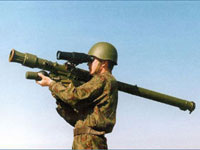Russia’s globally recognized military hardware shamefully pirated in Western countries
The Russian government is concerned with the problem of pirated Russian arms made in other countries, including the new East European members of the WTO and EU. It turns out that this matter is of a concern not only for analysts and observers. For the first time this problem was publicly mentioned on the highest political level. At the meeting of the Committee on Export Control held recently in Moscow Russian First Vice-Prime Minister Sergey Ivanov put it flatly that western countries, forbidding the sales of the Russian arms in their markets, are openly copying Russian developments on profit on this.

Russia has been repeatedly trying to draw attention of its partners to this problem. Hopefully the government seriously decided to solve the problem. "In fact we openly spoke about this earlier, this is not a piece of news, - Sergey Ivanov said, - a number of East-European countries continue intellectual piracy and illegally use, first of all Soviet licenses, despite of the numerous offers of the Russian Federation to settle this point. From some countries we have not received any more or less reasonable reaction so far".
At the exhibitions of arms Russian designers continuously observe surprisingly familiar samples of arms with absolutely unfamiliar names. For example, Poland makes air defense rocket complex ZU-23 2KG. It is a direct analogy of the Russian domestic complex. One year ago Poland delivered 48 tanks PT-91 "Tvyardy" worth $ 348 million to Malaysia. De facto this is a modified Russian tank T-72. Poland is not ashamed to offer in the international markets portable antiaircraft-rocket complex OSA, i.e. a pirated version of the Russian PZRK "Igla".
Romania recently was about to sell a “newly developed” armored personnel carrier to a Middle East nation. The deal failed because the Romanian design was ridiculously close to the Russian BTR-80. Fake Kalashnikov machine guns break all possible record of piracy. Romanian, Polish, Hungarian, Bulgarian, Chinese, Serbian Kalashnikovs cost around the world approximately 50 dollars per one, which is much cheaper than the prices of the Izhevsk plant.
Bulgaria , for example, delivered to Georgia four attack planes Su -25 and promised to sell five more. Besides, Bulgaria sold to the same customer some batches of anti-tank and antiaircraft means totally worth $ 10 million. Sukhoi, the owner of the intellectual rights on the attack planes Su-25, is not going to draw attention to the trade with the old, still the Soviet aircraft, among third countries. But it expressed concern about the offer of Sofia to modernize these aircraft for the third countries. Without designers’ supervision such work is regarded illegal. There have been several cases when the illegally upgraded Soviet aircraft and helicopters crushed in severe accidents due to the lack of competence during the upgrade.
Political partners of Russia do not react to the threats of Russia to bring such cases to the international court, maybe because such threats never came true so far. This is not the problems of manufacturers alone, the Ministry of Foreign Affairs, and also the government of the Russian Federation must demonstrate their position by taking specific measures. It is not clear what functions the recently created Russian Federal Agency on Protecting Intellectual Rights will have. Is it high time to hear the voice of this organization? It is necessary, probably, to follow the examples set by the USA. Washington feels absolutely comfortable to impose sanctions against those countries and companies which break the intellectual rights of the American firms. Why not to deprive Poland and other East European nations of the advantages they have in the trade with Russia?
Yuri Seleznyov
Pravda.ru
Subscribe to Pravda.Ru Telegram channel, Facebook, RSS!


